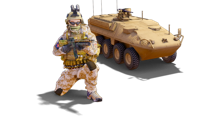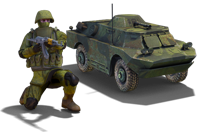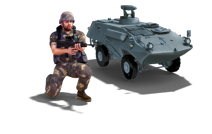Difference between revisions of "Mechanized Infantry"
From Conflict of Nations Wiki
| Line 6: | Line 6: | ||
[[File:Mechanized infantry 3 big.png|thumb|EU Mechanised infantry]] | [[File:Mechanized infantry 3 big.png|thumb|EU Mechanised infantry]] | ||
</div> | </div> | ||
| − | + | Mechanised Infantry are infantry equipped with armoured personnel carriers (APCs) or infantry fighting vehicles (IFVs) for transport and combat. | |
| − | + | Mechanised infantry is distinguished from motorized infantry in that its vehicles provide a degree of protection from hostile fire, as opposed to "soft-skinned" wheeled vehicles (trucks or jeeps) for motorized infantry. Most APCs and IFVs are fully tracked or are all-wheel drive vehicles (6×6 or 8×8), for mobility across rough ground. Some nations distinguish between mechanised and armoured infantry, designating troops carried by APCs as mechanised and those in IFVs as armored. | |
| − | Compared with "light" truck-mobile infantry, | + | Compared with "light" truck-mobile infantry, mechanised infantry can maintain rapid tactical movement and, if mounted in IFVs, have more integral firepower. It requires more combat supplies (ammunition and especially fuel) and ordnance supplies (spare vehicle components), and a comparatively larger proportion of manpower is required to crew and maintain the vehicles. For example, most APCs mount a section of seven or eight infantrymen but have a crew of two. Most IFVs carry only six or seven infantry but require a crew of three. To be effective in the field, mechanised units also require many mechanics, with specialized maintenance and recovery vehicles and equipment. |
</div> | </div> | ||
| Line 16: | Line 16: | ||
<div> | <div> | ||
[[File:Mechanized Inf cam2 Idle 9 000 basic.png|left|thumb|85px]] | [[File:Mechanized Inf cam2 Idle 9 000 basic.png|left|thumb|85px]] | ||
| − | The | + | The Mechanised Infantry is a fast unit, especially well-suited for a range of missions, and through support and flank protection greatly increase the survivability of heavy armour such as Main Battle Tanks. They are capable of conquering and holding strategic enemy targets such as Provinces or Cities, and have some protection against Weapons of Mass Destruction. They can be strategically airlifted to any location around the globe. |
They are particularly strong in open terrain, but vulnerable in cities, mountains, and other difficult terrain. | They are particularly strong in open terrain, but vulnerable in cities, mountains, and other difficult terrain. | ||
</div> | </div> | ||
Revision as of 14:06, 2 March 2018
Description
Mechanised Infantry are infantry equipped with armoured personnel carriers (APCs) or infantry fighting vehicles (IFVs) for transport and combat.
Mechanised infantry is distinguished from motorized infantry in that its vehicles provide a degree of protection from hostile fire, as opposed to "soft-skinned" wheeled vehicles (trucks or jeeps) for motorized infantry. Most APCs and IFVs are fully tracked or are all-wheel drive vehicles (6×6 or 8×8), for mobility across rough ground. Some nations distinguish between mechanised and armoured infantry, designating troops carried by APCs as mechanised and those in IFVs as armored.
Compared with "light" truck-mobile infantry, mechanised infantry can maintain rapid tactical movement and, if mounted in IFVs, have more integral firepower. It requires more combat supplies (ammunition and especially fuel) and ordnance supplies (spare vehicle components), and a comparatively larger proportion of manpower is required to crew and maintain the vehicles. For example, most APCs mount a section of seven or eight infantrymen but have a crew of two. Most IFVs carry only six or seven infantry but require a crew of three. To be effective in the field, mechanised units also require many mechanics, with specialized maintenance and recovery vehicles and equipment.
Features
The Mechanised Infantry is a fast unit, especially well-suited for a range of missions, and through support and flank protection greatly increase the survivability of heavy armour such as Main Battle Tanks. They are capable of conquering and holding strategic enemy targets such as Provinces or Cities, and have some protection against Weapons of Mass Destruction. They can be strategically airlifted to any location around the globe.
They are particularly strong in open terrain, but vulnerable in cities, mountains, and other difficult terrain.



